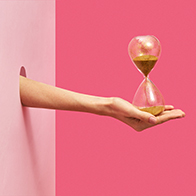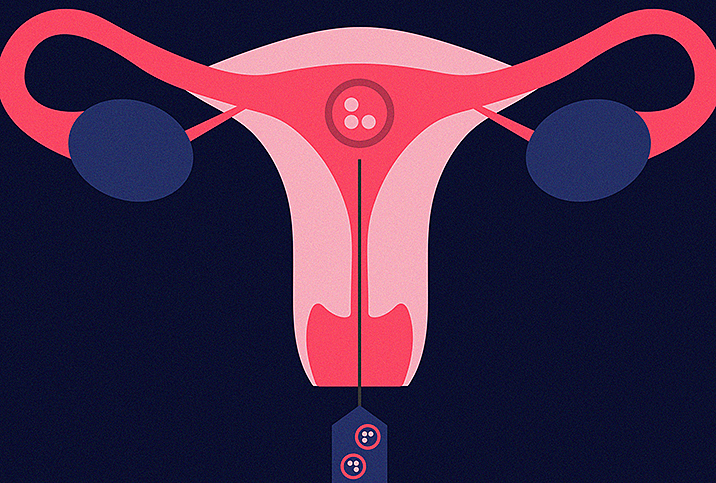America Has Entered an Egg-Freezing Boom

Fifty may be "the new 30," but unfortunately, when it comes to issues of fertility, the "age is just a number" line of thinking doesn't always apply. The reality is, according to the American College of Obstetricians and Gynecologists (ACOG), a woman's fertility starts declining in her 30s, becoming more rapid by her mid-30s, so that "by 45, fertility has declined so much that getting pregnant naturally is unlikely for most women."
Yikes. For young women looking to focus on their careers, or those who don't have a relationship (if one is desired) to help with the family-starting process, the reality of "the ticking clock" can feel overwhelming. Especially if the woman in question knows she wants a family in the future…just not for a few more years.
The thing is, more and more women are choosing to delay motherhood for longer. It's not unusual for women to start having children well into their 30s. I, for one, just gave birth to my first child at the "geriatric" age (according to my gynecologist) of 39. I was fortunate I was able to get pregnant naturally, but not without needing a small surgery to make it possible, and not without anxiety about whether my "window of opportunity" had passed. And certainly, if I choose to have a second child, I'll be dealing with the potential reality of secondary infertility due to my increasing age.
With the desire to delay motherhood becoming more common along with advances in fertility science, young women's options for monitoring and preserving fertility are much greater than they were even a decade or two ago. And one of the most popular methods young women are using to ensure they can start a family when they're ready to do so? Egg freezing.
Essentially, women are opting to freeze their young, healthy eggs at their "peak fertility" in their 20s, making it possible to use these eggs to get pregnant well into their 30s or 40s. But freezing eggs isn't as easy as walking into a fertility clinic and saying, "Let's freeze these babies!"—it's an option many women may want to consider, but that doesn't mean it's the right choice for everyone.
Why women might consider freezing their eggs
Cynthia Hudson, M.Sc., VP of clinical strategy and specimen services at TMRW Life Sciences, a platform for tracking, monitoring and storage of frozen eggs and embryos used in in vitro fertilization (IVF), points out it's not just young women who may want to preserve their eggs. She states that younger women may be more inclined to pursue egg-freezing to give themselves options in the future (the opportunity to pursue careers or education before becoming a mom), or to empower themselves to be the sole decision-maker of their future fertility decisions.
That said, older women may be in a slightly more "critical" point of future family planning. Hudson points out they may be trying to decide between single motherhood or childlessness, or they may still be waiting to meet the right partner. They may also be trying to weigh other options, such as using a donor egg or pursuing adoption, while keeping the door open to having a biological child as well.
"Another reason is that egg-freezing is available now and there is some added pressure—pressure to decide if it's an option financially, or pressure from peers because it is an option," Hudson said. But she doesn't mince words—egg-freezing isn't a choice to take lightly: "You need massive commitment to get it done."
Reasons for the rise in egg-freezing
Many fertility clinics have seen a sharp increase in egg-freezing rates in recent years, reporting anywhere from a 20 percent to a 50 percent jump from 2019 to 2020. Though data is currently lacking for the 2020 to 2021 timeframe, the clinics we spoke with say the surge is continuing. While there are likely many reasons (increased awareness of the service being an obvious one), there are some very practical explanations for this increase.
"I would certainly attribute much of the popularity to the sizable increase in insurance coverage for egg-freezing that we've seen implemented by large employers over the past few years," said Claire O'Neill, co-founder of FertilitySpace, a site that helps men and women find fertility clinics in their area. "As of 2021, a fifth of large U.S. employers that have 20,000 or more employees reported that they offer coverage for egg-freezing. That's a pretty impressive jump from just 6 percent in 2015."
'The pandemic gave many women the time they needed to actually go through a cycle of egg-freezing.'
Hudson concurs that more women are taking employer insurance coverage for fertility preservation and family building into consideration when looking for jobs. And government mandates are starting to make such coverage more available. "New York now has a mandate for large employers, and Massachusetts and Illinois have statewide mandates," Hudson said. "But I dare say, very few women are moving to Massachusetts or Illinois just for fertility coverage."
One other factor that may be playing a role in the rise of egg-freezing is the impact of the COVID-19 pandemic. "The pandemic certainly seems to have changed the way many women are thinking about their family-building plans," O'Neill confirmed. "The pandemic gave many women the time they needed to actually go through a cycle of egg-freezing."
This is an important factor, given that the process is time-consuming and requires lots of energy and effort. With more people working from home and experiencing more flexibility with their time, the pandemic may have opened up a door to egg-freezing that simply wasn't an option pre-pandemic.
The financial cost of freezing your eggs
The availability of health insurance to cover the cost of egg-freezing is a very real and important consideration given that both Hudson and O'Neill state that a single round of egg-freezing can cost anywhere from $10,000 to $16,000.
And if one round doesn't preserve the number of eggs a woman was hoping to harvest and freeze? She may decide to undergo two or three rounds to achieve her goals. That's a hefty chunk of money.
Keep in mind, that's just for the rounds of medication and medical expense of retrieving the eggs. While the upfront cost may (key word being may) include a year's worth of storage, the annual cost to keep your eggs frozen can be anywhere from $600 to $1,000. Again, not exactly chump change.
"Social media, bloggers, and startups advocating wellness, health, and empowerment have all led to a larger discussion about fertility and egg-freezing," Hudson said. "But the majority of eligible women don't freeze their eggs. It's a big financial commitment."
"It's simply out of reach for most people," Hudson admitted.
The time commitment required
It's not just the financial cost that places egg-freezing out of reach for many people. It's a big time and physical commitment, too.
"The egg-freezing process takes about two weeks in total once you start the medications," O'Neill explained. "It involves a lot of coordination, injections, and early morning doctor's visits throughout that time.
"That can be difficult for women to juggle if they have a full-time job or other responsibilities," O'Neill added.
Options when egg-freezing doesn't seem financially feasible
If you're one of the (many) women who don't have insurance coverage to help reduce the expense of freezing your eggs, that doesn't mean you're completely out of luck. If you're serious about wanting to preserve your fertility in this manner, you may just need to ask a few more questions.
O'Neill pointed out that many clinics offer payment plans to help make the expense more accessible. But that's not the only option. "Research nonprofits that offer infertility grants," she advised. "Most of these grants are usually for couples that need help affording IVF or surrogacy, but some do also grant money to women undergoing egg-freezing."
Finally, you may want to ask about egg donation programs at your clinic. "There are fertility clinics that will freeze your eggs for free if you're willing to undergo an egg donation cycle, where you donate some of your eggs to an infertility patient who cannot conceive using their own eggs," O'Neill explained. Of course, you may not be comfortable with donating your eggs, so it's not a viable option for everyone.
Other things to keep in mind
Clearly, freezing your eggs isn't a decision that should be taken lightly. If it's a route you're interested in pursuing, it's important to have clearly defined reasons for your decision, and it's important to talk to the right kind of specialist.
"You should be seeking out a reproductive endocrinologist at a fertility clinic," O'Neill advised. "While it's great to start the conversation with your OB-GYN, they aren't the specialist you'd actually work with to freeze your eggs.
"Most reproductive endocrinologists will first have a patient do fertility testing," she continued, "and then will counsel each woman based on her unique situation and fertility goals."
And, it's important to remember that just because you freeze your eggs, that doesn't mean you'll end up needing to use them. While infertility is a rising concern, especially for women who wait until later in life to start a family, it's not a foregone conclusion.
Just as I was able to conceive naturally at 38 years old, many women can have successful "old-fashioned" pregnancies well into their 40s. So, even if you end up freezing your eggs with the intent to use them down the road, you may also want to ask to be screened at the time of your freezing to determine if you could donate them at a later date. Because if you end up deciding not to use the eggs you freeze, the option to donate to another woman in need is a generous (though certainly not required) gift that you may want the option to give.
Regardless of whether or not you decide to freeze your eggs, it's nice to know that fertility technology and access to services continues to expand. And, it's worth asking future employers whether the cost of egg-freezing is something their insurance covers. With greater demand and interest, there's likely to be continued expansion of programs and services to help with family planning and building. And, ultimately, that's a positive thing for men and women alike.




















